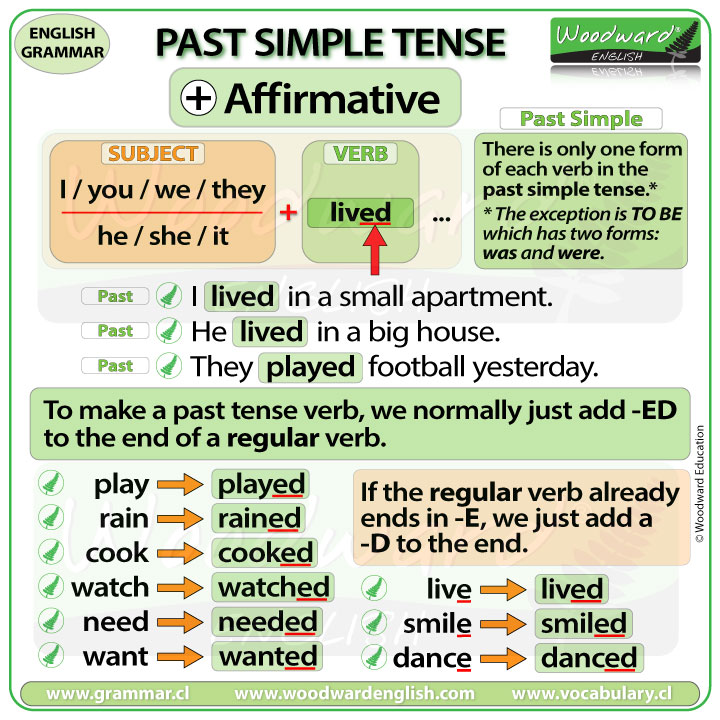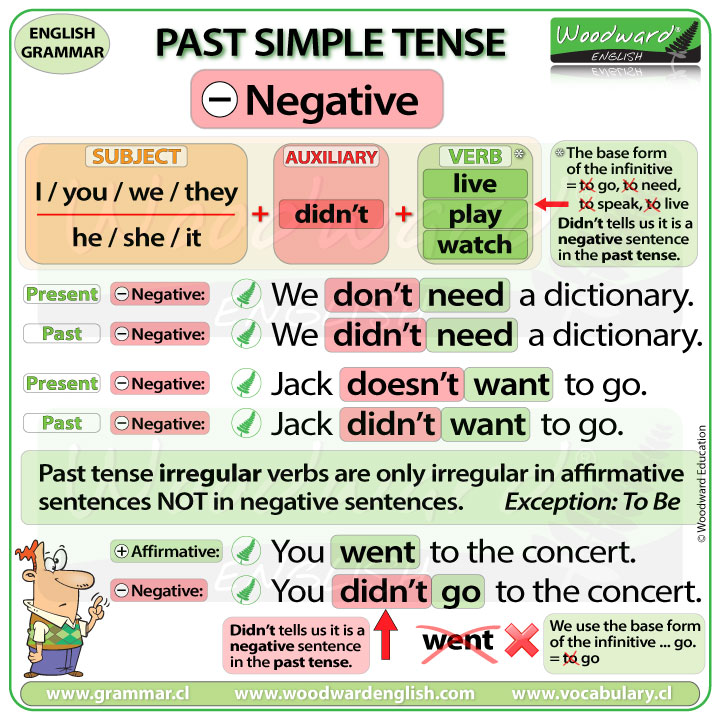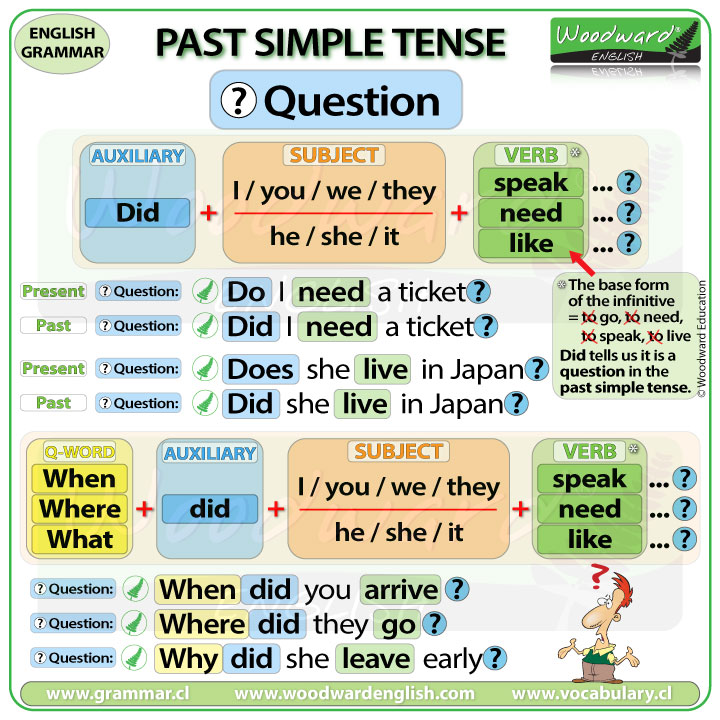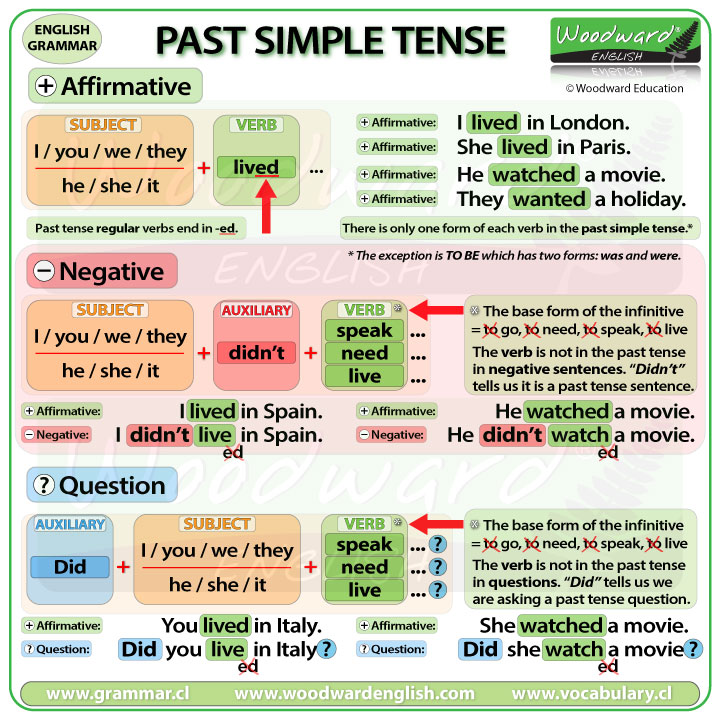Past Simple Tense in English – Regular and Irregular verbs in the past tense
In the present simple tense, we say:
- I live …
- You live …
- We live …
- They live …
BUT, for HE, SHE and IT, we add an S to the end of their verb in the present simple. So we say:
- He lives …
- She lives …
- It lives …
However, for the past simple tense it is much easier.
There is only one form of each verb in the past simple tense.*
* The exception is TO BE which has two forms: was and were. We will see more about this later.
The past tense of LIVE is LIVED.
LIVED is used for all subjects including HE, SHE and IT.
- I lived …
- You lived …
- We lived …
- They lived …
- He lived …
- She lived …
- It lived …
You can see that the past tense verb is the same for all subjects. There is only one form for each verb.
Look at these examples in the present simple tense:
- I live in a small apartment.
- He lives in a big house.
How can we change these sentences into the past tense?
They become…
- I lived in a small apartment.
- He lived in a big house.
Notice how in the present tense, the verb changes: I live – he lives.
But in the past tense, the verb is the same: I lived – he lived.
How can you make a past tense verb?
To make a past tense verb, we normally just add -ED to the end of a regular verb.
- play becomes played
- rain becomes rained
- cook becomes cooked
- watch becomes watched
- need becomes needed
- want becomes wanted
If the regular verb already ends in -E, we just add a -D to the end.
For example: LIVE already ends in an E so we just add -D to the end:
- live becomes lived
- smile becomes smiled
- dance becomes danced
See our lesson about the spelling of words ending in ED for more examples and exceptions.
Let’s look at some more example sentences using regular verbs in the past simple tense:
- I played my guitar yesterday.
- It rained last night.
- He fixed his bike last weekend.
- Angela watched TV all night.
- Paul wanted to go to the museum.
Now listen to the pronunciation of ED at the end of each verb (in the video).
Played, rained, cooked, watched, needed, wanted.
Notice how the final ED is pronounced in three different ways.
- /d/
- /t/
- /id/
Listen to the video again:
- played … ends in a /d/ sound
- rained … ends in a /d/ sound
- cooked … ends in a /t/ sound
- watched … ends in a /t/ sound
- needed … ends in a /id/ sound
- wanted … ends in a /id/ sound
I recommend watching our complete English lesson about the pronunciation of ED at the end of words.

Negative Sentences – Past Simple Tense
Look at these sentences:
- They live in Spain. (Present Tense – Affirmative sentence)
- They lived in Spain. (Past Tense – Affirmative sentence)
The only difference is that the verb in the past tense ends in ED.
What is the negative form of the sentence in the present simple tense?
- They live in Spain … becomes …
- They don’t live in Spain.
Don’t and doesn’t are used in the present simple tense to make a negative sentence.
But how do we make a negative sentence in the past simple tense?
We just use didn’t.
- They lived in Spain … becomes …
- They didn’t live in Spain.
We do not say they didn’t lived in Spain. No!
Look at the summary chart. CHART
Didn’t is used to make negative sentences in the past simple tense.
Remember, in the present simple tense, don’t and doesn’t are used.
In the past simple tense, we only have one auxiliary: didn’t
I didn’t, you didn’t, we didn’t, they didn’t, he didn’t, she didn’t, it didn’t.
Didn’t is used for all subjects… it is so easy!
But comes after didn’t?
The verb after didn’t is always the base form of the infinitive.
didn’t live … didn’t play… didn’t watch
The auxiliary didn’t tells us it is a negative sentence in the past simple tense.
Let’s look at the two negative sentences again:
- They don’t live in Spain.
- They didn’t live in Spain.
The only difference between these negative sentences in the present tense vs. the past tense are the auxiliaries don’t or doesn’t and didn’t.
Change these negative sentences from the present tense to the past tense:
- I don’t play the piano. …becomes…
- I didn’t play the piano.
- She doesn’t live in Italy. …becomes…
- She didn’t live in Italy.
- We don’t need a dictionary. …becomes…
- We didn’t need a dictionary.
- Jack doesn’t want to go. …becomes…
- Jack didn’t want to go.
Some more examples of negative sentences in the past simple tense:
- I didn’t want to go home.
- You didn’t need my help.
- He didn’t like the soup.
- She didn’t open the door.
- We didn’t say anything.
- They didn’t drive to work.

Questions – Past Simple Tense
Look at these sentences again:
- They live in Spain. (Present Tense – Affirmative sentence)
- They lived in Spain. (Past Tense – Affirmative sentence)
How do we make a question in the present simple tense?
- They live in Spain … becomes …
- Do they live in Spain?
We just add Do to the beginning. Do and does are used in the present simple tense to make a question.
But how do we make a question in the past simple tense?
We add did to the beginning.
- They lived in Spain … becomes …
- Did they live in Spain?
Notice how we the verb LIVE is used because it is the base form of the infinitive just like with negative sentences.
We do not say: Did they lived in Spain? No!
In English, we use DID to make questions in the past simple tense.*
* Exceptions: Questions with To Be or Modal Verbs (can, might, must, etc.)
So, the questions are:
- Do they live in Spain? (Present simple tense)
- Did they live in Spain? (Past simple tense)
The only difference between these questions in the present tense vs. the past tense are the auxiliaries do or does vs. did.
Change these questions from the present tense to the past tense:
- Do you play football? …becomes…
- Did you play football?
- Does he want to go? …becomes…
- Did he want to go?
- Do I need a ticket? …becomes…
- Did I need a ticket?
- Does she live in Japan? …becomes…
- Did she live in Japan?
Some more examples of questions in the past simple tense:
- Did I win the prize?
- Did you need my help?
- Did he like the soup?
- Did she open the window?
- Did we arrive on time?
- Did Steve walk to school?
Short Answers in the Past Simple Tense
With questions beginning with DID, you can often give a short answer.
Look at these questions. What are some possible short answers?
- Did you need my help?
Yes, I did … or … No, I didn’t. - Did she open the window?
Yes, she did … or … No, she didn’t. - NOT IN VIDEO: Did we win the game?
Yes, we did … or … No, we didn’t. - Did Steve walk to work?
Yes, he did … or … No, he didn’t.
Question Words in the Past Simple Tense
With questions, you can also use one of the “question words” such as when, where, why, what, who, which etc. before DID.
Look at these example questions:
- When did you arrive?
- Where did they go?
- Why did she leave early?
- What did he say?
- Who did you see?
- Which did you choose?
- How did you learn English?

Past Simple Tense – Irregular Verbs – Affirmative Sentences
For now, we have only seen regular verbs in the past tense.
BUT, don’t worry, irregular verbs in the past tense are also easy.
Let’s look at the verb TO GO.
In the present tense it is GO or GOES.
The past tense of GO is WENT.
WENT is used for all subjects…
I went, you went, he went, she went, it went, we went, and they went.
They all use WENT. For example:
- I went to the beach last weekend.
- She went to the dentist last week.
- They went to the library yesterday.
- You went to a concert last night.
For the past tense of GO, you just need to learn one word… WENT.
The best thing is that you only need to know this irregular form for affirmative sentences
Past Simple Tense – Irregular Verbs – Negative Sentences
For negative sentences in the past tense, we follow the same rules as regular verbs.
We use didn’t with the verb in its base form. For example:
- You went to the concert. (This is an affirmative sentence)
What do we make this a negative sentence in the past simple tense? We use DIDN’T.
- You didn’t go to the concert.
Notice how we use GO because we have the base form of the infinitive: instead of TO GO, just GO.
We don’t say: You didn’t went to the concert. X NO! Didn’t tells us it is in the past tense.
- You didn’t go to the concert. (This is correct)
Here is another affirmative sentence in the past tense.
- He went to the park.
How can we make this a negative sentence?
- He didn’t go to the park.
Again, the auxiliary didn’t tells us it is negative sentence in the past simple tense.
Past Simple Tense – Irregular Verbs – Questions
Now look at the affirmative sentence again:
- You went to the concert.
How can we make this a question?
Using the same rules for regular and irregular past tense verbs.
We use DID at the beginning while the verb is in the base form of the infinitive.
The question is:
- Did you go to the concert?
The auxiliary DID at the beginning tells us it is a question in the past simple tense.
Notice how we use GO because we have the base form of the infinitive: instead of TO GO, just GO.
We don’t say: Did you went to the concert? X NO! Did tells us it is a question in the past tense.
Look at this affirmative sentence:
- He went to the park.
How can we change it into a question? We say:
- Did he go to the park?
Again, did tells us it is a question in the past tense.
Past Simple Tense – Irregular Verbs – Summary
So basically, past tense irregular verbs are only irregular in affirmative sentences.
AND there is only one form for each verb. For example:
- You went to the concert.
- You didn’t go to the concert.
- Did you go to the concert?
You can see that GO is only irregular in affirmative past tense sentences when it becomes WENT.
In negative sentences and questions, we use GO.
Of course, there is an exception… TO BE!
We will see this in a separate lesson.
I recommend watching our lesson with 101 irregular verbs in the past tense. It includes example sentences.
Past Tense in English – Explained in Spanish
Nuestra explicación del tiempo pasado en inglés con una explicación en español:
Past Simple Tense Summary Chart

I hope you found this English lesson about the Past Simple Tense useful.
If you did, please let other people know about it.


